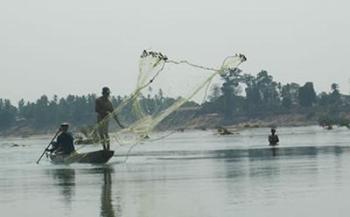Feb 25 2016
A recent study from the International Union for Conservation of Nature (IUCN) and the University of Southampton reveals that inland freshwaters with a wide range of fish species contain higher-yielding and less variable fisheries.
 Fishermen at work on the Mekong River. Credit: Dr William Darwall
Fishermen at work on the Mekong River. Credit: Dr William Darwall
Almost two billion people directly depend on inland freshwaters (wetlands, rivers, and lakes) for their food. However the association between yield and biodiversity continues to be poorly understood, even though an increasing number of freshwater species contribute to food security.
Researchers from the University of Southampton have used datasets from the Food and Agriculture Organization of the United Nations (FAO) and IUCN, spanning 100 countries in Europe, Africa, and parts of Asia to carry out a large-scale test to analyze the effect of freshwater biodiversity on fishery production and the variability of the fishery yields over time.
The researchers considered a number of factors that are expected to impact the yield. These factors include; lake sizes, precipitation, temperature, and fishing effort. This analysis revealed that fisheries with an increasing number of species also produce higher yields. The researchers highlighted that in parts of the world with a large number of fish species, the stability of the yield enhanced every year. This stable yield existed in places like Thailand, Vietnam, Democratic Republic of Congo, and Tanzania.
Emma Brooks, Postgraduate Research Student in the University’s Centre for Biological Sciences and lead author of the study, said: “The results suggest that fish biodiversity may deliver benefits for human wellbeing. As such, these results provide a powerful argument for placing biodiversity conservation centrally within fisheries management, particularly in countries with the highest yielding inland fisheries as these also tend to have high freshwater biodiversity.”
Our study demonstrates that maintaining healthy freshwater systems that support a wide variety of fish (not just those targeted for fishing) is good not only for freshwater species conservation, but is also critical for food security and livelihoods. This is especially true in developing countries where fisheries provide a major source of protein and micronutrients, are a source of income, and where they are used as a safety net in times of hardship such as when crops fail.
Dr Felix Eigenbrod, Associate Professor (Spatial Ecology) Centre for Biological Sciences
The researchers point out that beyond food security it is also important to understand the extent of support given by biodiversity to freshwater fisheries. This has specific policy relevance as freshwater systems hold immense significance for biodiversity conservation. Freshwater habitats are disproportionately rich in species based on the fact that they cover just 0.8% of the surface of the Earth, but include 10% of known species, and as many as a third of all vertebrates.
Inland waters are the most threatened systems globally, with dams, water extraction, pollution and invasive species as well as overharvesting of the fisheries themselves recognized as some of the biggest threats. It is imperative that the relationships we explored should be considered within freshwater and fisheries management; the protection and conservation of species diversity in freshwater systems is a win–win outcome for human food security and conservation efforts to preserve freshwater ecosystems.
Dr Will Darwall, Head of the IUCN’s Freshwater Biodiversity Unit
The study results also indicatethe urgent requirement for additional data to thoroughly understand and control biodiversity’s contribution to inland fisheries located all over the world.
There is a lack of data for freshwaters, including a thorough understanding of species compositions and distributions worldwide. Equally, a concentrated effort is required to increase reporting not only of inland fishery yields, but also of fishing efforts. Only by doing this will we be able to fully understand the extent of the role that biodiversity plays in underpinning inland fisheries.
Emma Brooks, Postgraduate Research Student, Centre for Biological Sciences
This research was supported by the IUCN and the Biotechnology and Biological Sciences Research Council. A report on this research is featured in Global Ecology and Biogeography.